
In 2019, we had the nasty old fossil-gas, natural-draft water heater removed. (That’s it in the photo below.) Outside of running a gasoline-powered generator or kerosene space heater inside a house, this kind of water heater is probably the No.1 source of carbon monoxide in homes. Yes, the hot water is cheap, but how much is your health worth? So my replacement for this fossil was a heat-pump water heater (HPWH). It’s a Rheem Performance Platinum, and I love it!

Choosing a heat-pump water heater
I am not an expert in heat-pump water heaters, and I don’t know the range and availability of products all that well. But I have friends who keep up with that stuff, so I asked one of them. John Semmelhack of Think Little is a big proponent of all-electric homes, and he recommended the Rheem model that I ended up buying. Manufacturers are always changing their models, though; I bought the Gen 4 but what’s available now is the Gen 5 model (I think). Also, when you’re searching for information, Rheem uses the term “hybrid water heater” because it has two sources of heat. The main source is the heat pump, but it also has built-in electric resistance heating to supplement the heat pump.
One of the choices you have to make when buying any water heater is size. I sprang for the 80-gal. model for a simple reason: If I’m going to use a heat-pump water heater, I want it to use the heat pump all the time. I don’t want to use the electric resistance heating element at all unless the heat pump fails. The smaller the tank you buy, the more likely it is you’ll have to use some electric resistance heating.
The bigger tank has the other advantage of having more hot water available. My 80-gal. model has an 89-gal. first-hour rating. Did I go overboard? Yeah, probably. I do that sometimes. In September, we put it to the test, as we had family in town for my 120th birthday party.* The larger tank provided all the hot water we needed with five people in the house, and it stayed on heat pump–only mode the whole time.
The Rheem app
The Rheem HPWH connects to WiFi and has a nice app for your smartphone. The screenshot below shows the main screen for the water heater, with the basic info about the Gen 4 model including water temperature setting (120°F), mode (heat pump–only), and links to other data (schedules, usage report, and WiFi settings).
It has one annoying feature I wish Rheem would change: That green bar is ALWAYS there because I’ve set the mode to heat pump–only. Their so-called Energy Saving mode would actually use more energy because it would use electric resistance heat sometimes.
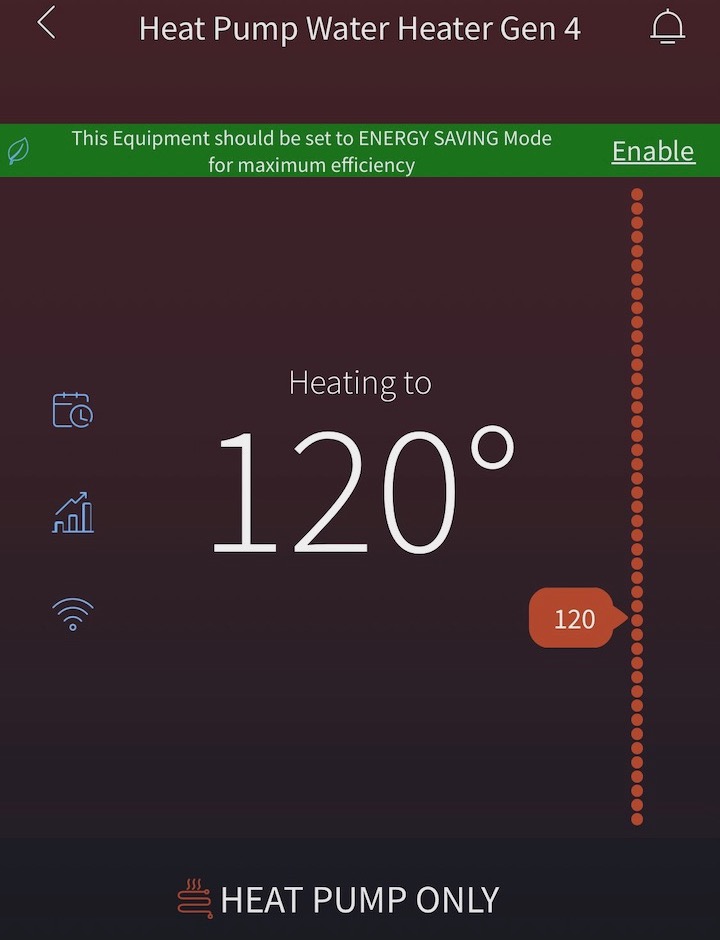
Monitoring energy use
We fired up, so to speak, our new water heater on September 14, 2019, so we’ve passed the two-year mark. How much electricity have we used in that time? The chart below shows our first full year of data. The total was 486 kilowatt-hours (kWh). The lowest month was August at 23.75 kWh, and the highest was December at 68.6 kWh.
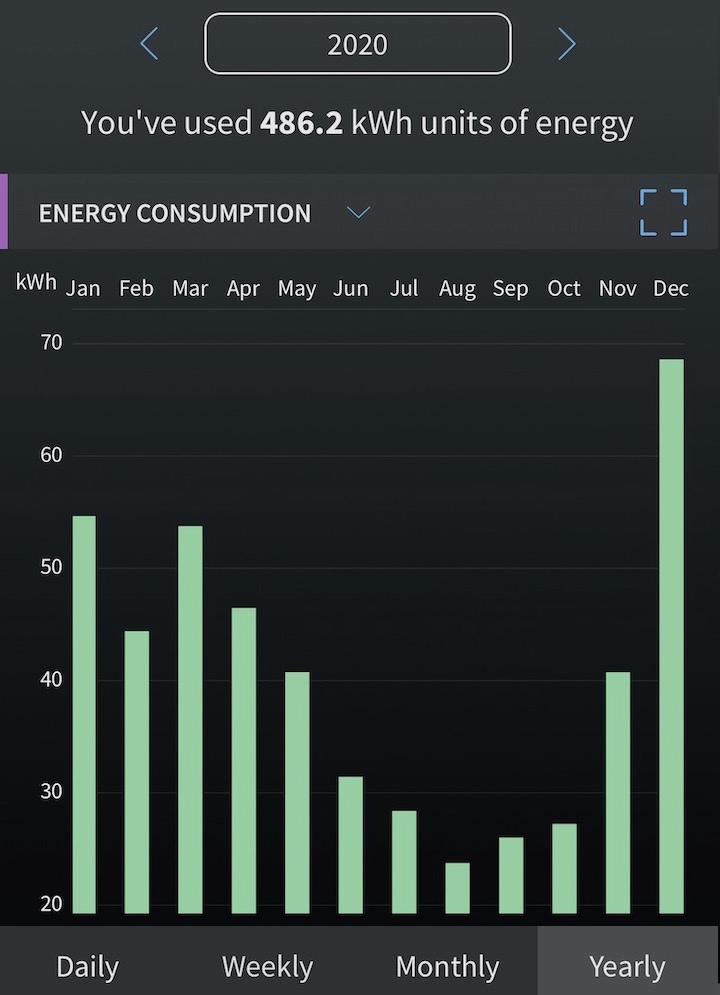
Notice the pattern? Water heating energy use is low in summer and high in winter. The main reason for that is the entering water temperature. As everything cools down in the fall, the municipal water supply cools down, too. That means it takes more heat pumped into the water to raise the temperature to 120°F.
A second reason is that we use more hot water in winter, although I haven’t measured that yet. Next year, however, I’m going to set up flow meters and temperature sensors on my all-new hot water plumbing when I remodel my basement. Then I’ll have the data to prove it, at least in my house. Those data will also tell me how many kilowatt hours it takes to get a gallon of hot water, by each month of the year and averaged over the whole year.
A third reason we use more energy in the winter is that the HPWH pulls heat out of the air, and our basement air is cooler in winter. In my case, we currently don’t heat or use the basement much, so it’s not a big deal. In cold climates, it can be a big deal.
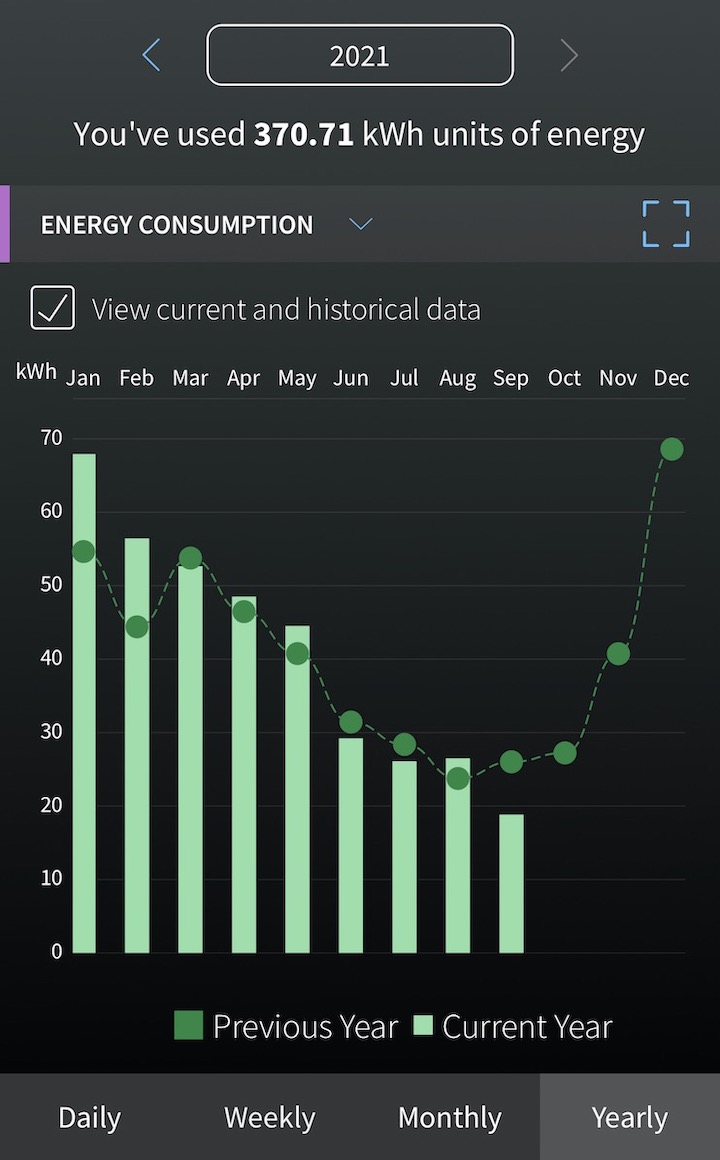
Another nice feature of the Rheem app is that it can show your current usage compared to usage for the previous period. The chart above shows it by month for 2021, compared to the corresponding months in 2020. It also does daily by hour, weekly by day, and monthly by day.
Our annual consumption
Since it’s been over two years since I started up the HPWH, I can tell you how much energy we used in that time and how much it has cost us. From September 14, 2019 to September 14, 2021, we used 1002 kWh. I also track our electricity use in a spreadsheet (doesn’t everybody?), and over that period, our average rate from Georgia Power has been almost exactly $0.10 per kWh (excluding taxes and fees). So, we’ve paid just a bit (two bits actually) over $100 for two years’ worth of hot water.
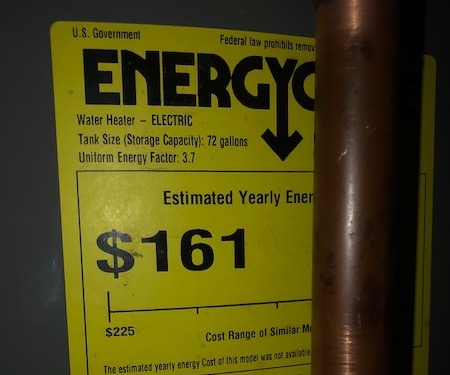
How does that compare to our old fossil-gas water heater, you ask? We lived with it for less than three months, so I don’t have full data. But based on the little I do have, it looks like the gas-fueled water heater would have cost close to the same amount (again, excluding taxes and fees). So, there’s no direct economic benefit to switching from a gas water heater to a heat-pump water heater—when I look at the cost based on rates only.

I had already made the decision to get rid of our gas furnace, however, and that meant our only remaining gas appliance would be the water heater. At about $38 per month (screenshot above), the fees just to have gas would make the HPWH a big money saver. Based on a marginal cost of $1200, the extra $450 per year would give me a simple payback of about 3-1/2 years!
If I had replaced our gas water heater with an electric-resistance water heater, we still would have saved money; just not as much. The efficiency of water heaters is rated by something called the Uniform Energy Factor (UEF). Higher numbers are better, and my HPWH has a UEF of 3.7. (You can see it on the EnergyGuide above.) A standard electric water heater has a UEF of about 0.9, making my HPWH about 4.1 times as efficient.
Instead of 501 kWh per year, I would have used about 2000 kWh per year with an electric-resistance water heater. At $0.10 per kWh, I would have saved about $150 per year on water heating. With a simple payback of about 10 years in this case, it wouldn’t be hard to justify this purchase for economic reasons, assuming a 15- or 20-year lifetime and minimal maintenance costs.
Noise, ducting, and filtration
One thing people have complained about with some HPWHs is that they’re too noisy inside the house. Some probably are, so I measured mine using the NIOSH SLM app on my phone. Here are my results:
- 53 dBA — 1 ft. straight out from the exhaust port
- 48 dBA — 1 ft. to the side of the exhaust port
- 46 dBA — 5 ft. away, at the mechanical room door
- 37 dBA — 4 ft. to the side of the mechanical room door with door open
That’s pretty quiet. For reference, here are some other noise levels on this scale:
- 60 dBA — normal conversation
- 50 dBA — rainfall
- 40 dBA — refrigerator hum
- 30 dBA — soft whisper
Another nice feature of the Rheem model I bought is that it allows for the intake air and exhaust air to be ducted. You can see the exhaust port in the lead photo. It’s to the right of the digital display screen. My water heater is in the basement, so I could run a duct up to the encapsulated attic to bring in warmer intake air and make the heat pump more efficient. But it’s probably more trouble than it’s worth in my case.
I will need to run a short duct to the mechanical room wall, though. After I remodel the basement and put a door on the mechanical room, the HPWH won’t have much air in that space, so the duct will bring in air from the rest of the basement.
Even without ducting air from another place, the ability to duct intake air allows for putting a better filter on the system. The filter that comes with it is one of those paper-thin, see-through filters that mostly catches larger stuff. I haven’t done it yet, but when I remodel and move the water heater, I’ll also add a decent filter to the system and get it all sealed up to eliminate bypass. I want to keep that coil as clean as possible.
Is it worth it?
In my case, it certainly was worth it. We have low rates for fossil gas here in Georgia, but they come with high fees. Getting rid of the backdraftable gas water heater was a high priority for me. Not having to worry about low-level carbon monoxide poisoning (or worse) brings a peace of mind that’s priceless. And I’m doing my part to decarbonize my existing home by going all-electric. I could have saved on first cost by going with a standard electric-resistance water heater. Had I been ready to put photovoltaics on my roof, I might have done that.
I am really happy with my HPWH. It’s quiet, efficient, and gives us all the hot water we desire. It even provides a little bit of cooling and dehumidification—the topic of an upcoming article.
_________________________________________________________________________
Allison Bailes of Atlanta, Georgia, is a speaker, writer, building science consultant, and the founder of Energy Vanguard. He has a PhD in physics and writes the Energy Vanguard Blog. He is also writing a book on building science. You can follow him on Twitter at @EnergyVanguard.
* OK, it wasn’t my 120th birthday party alone. My wife and I will be a combined 120 years old on Saturday. I turned 80.5 and she 39.5…or something like that.
Weekly Newsletter
Get building science and energy efficiency advice, plus special offers, in your inbox.





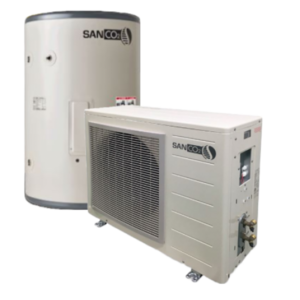
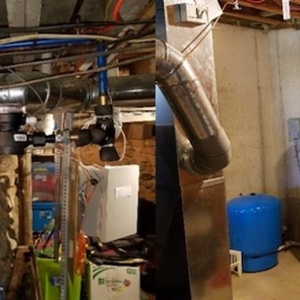
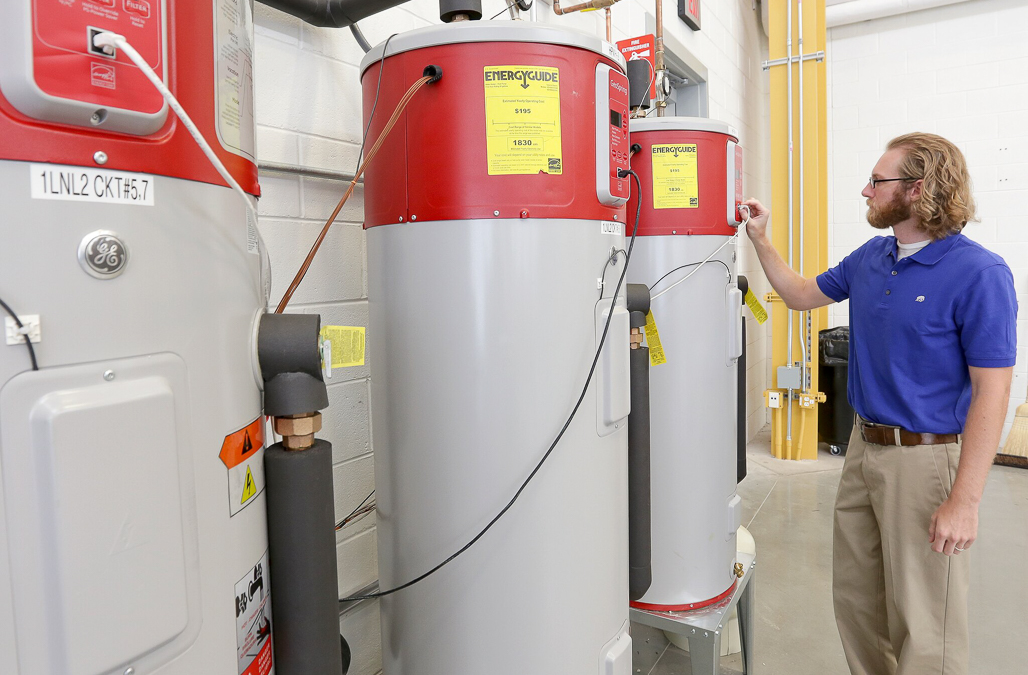







48 Comments
I'm pretty close to making this jump (and inevitably will), but have been stalled by word on the street that the Gen 5 models are noisy (https://www.greenbuildingadvisor.com/question/rheem-hybrid-water-heater-noise#comment-211004)
Hopefully Rheem will fix this issue soon and I'll happily make the change and get rid of one more natural gas element in my home.
Poor form double-posting, but on a different aspect of this, our water heater is in our ~1000sqft unfinished, walk-out basement here in greater Boston, where things can get rather cold. I'm slightly nervous about two aspects:
- Will the cooling effect of the heat pump drive the temperatures dangerously low down there? Obviously don't want it getting below freezing. I just put a temperature monitor down there yesterday to keep tabs on it, and while the front of the basement is below-grade, the rear is at-grade, so there's perhaps a bit more risk of freezing.
- Will the cool/cold air adversely affect the performance enough to matter? We have a soon-to-be-unused laundry chute in the same area, which I could use as a duct to get up to the second floor for some conditioned air (and louver over the existing hatch door upstairs). It's air we're paying to condition obviously, but it's heat-pump and PV powered, so perhaps a little less concerning.
If it gets too cold down there, you can, switch to electric heat mode for the coldest months of the year, and still have a large reduction in energy use averaged over the year. And you can use that as an incentive to air seal and insulate your basement better.
I’m outside if Boston, in a 1915 bungalow with now insulated walls and mostly insulated rim joist. Working on more airsealing. We installed a Gen 5 last winter. The temperature did not go below 53 deg. This was with our oil boiler down there which I gutted. So far I haven’t seen the temp drop below 58. Will see what happens with the long cold stretches. The noise is excessive with the Gen 5 unfortunately but I was able to gut our gas lines and meter so I don’t regret it. We have PV as well.
My own recent experience with a heat pump water heater for what it's worth: We replaced our 60 gal. electric heat with a 60 gal. heat pump heater - Bradford White - it is what our plumber carries. Heat pump only means we do run out of hot water so we ended up normally running it on hybrid. We also have an 11k PV system so I feel less guilty. Our basement is normally cool and moist - 1970 poured concrete with no exterior drainage and cracks in the wall but is otherwise relatively air tight There are several scenarios in which water comes in including high water table, snow melt and hard rain. The heat pump lowers the basement temperature a few degrees and dries it out some which is nice. It is currently running in the low 50s for both temperature and humidity. The wrench in this experiment is that I now have a low wattage bath fan pulling air out of the basement and into the bulkhead area continuously to depressurize the basement so that no air from the basement goes up into the living areas. This was due to health issues - we had to essentially sterilize the house when I came home from the hospital in an immune compromised state earlier this fall and the worst, moldiest air was in the basement. So some warm air must be pulled down there. But that moisture level is impressive.
People seem to be praising these systems, but there certainly is a list of caveats, most concerning to me is the makeup air dynamic, and I find the "we switch to electric in the winter" an interesting approach. My longtime plumber won't install them. I would be interested to see a cost benefit analysis between a HPWH and a new high performance stainless steel electric water heater, with considerations for service life of both. Anyone know of such comparison/analysis?
I also have an electric on demand water heater in a 1 br condo, hottest water I have ever experienced and it keeps up no problem in northern Maine climate. Always thought having one of these on each floor of a typical 2000 sf 3BR house wouldn't be a bad option.
Makeup air? It doesn't exhaust like a range hood. If you are putting it in a closet, maybe you want one of these: https://www.tamtech.com/product/perfect-balance-in-door-return-air-pathway/
Is that really a picture of how the gas water heater was installed in your house? Or was that a mock up to make it look bad? Whoever installed that should lose their license.
Tom: Sadly, that is indeed a photo of the water heater I replaced. The soldering was amateur, no doubt, but the temperature & pressure relief is plumbed so that it has to fight gravity. In most places, that's not allowed by code. Sadly, Georgia does allow it.
My initial reaction was to hope that the wrap of foil tape did not constitute the entirety of the mechanical connection of the vent pipe to the draft hood (!). Other than that, I'm not familiar with typical temps at the draft hood of a GWH, but I'm guessing it could exceed that of a dryer vent, which is at the upper limit of approved applications for even the most extreme grade of foil tape, AFAIK. I'd be concerned that the adhesive would degrade to dry and brittle over time.
Thanks for sharing! Is a system like this, or any other heat pump, appropriate for about 2700 sq ft of air-tight home?
brooksteve: Sure, there's nothing wrong with using a heat pump water heater in an airtight, efficient home. If you do use ducting on the intake and exhaust, just keep it all inside the building enclosure and provide return air pathways if necessary.
I am definitely a fan of my current gen4 Rheem hybrid. It's notably more efficient than the GeoSpring it replaces, as far as I can tell, and even that was quite a bit more efficient than the standard electric heater it replaces (gas is not an option in my neighborhood).
If I have one complaint, it's encapsulated in the "as far as I can tell" caveat - the app is very detailed but it's also completely unreliable. I keep a running daily total of my water heater usage in a spreadsheet, since 2018, so I know what the app was reporting at the time I recorded the usage... and what it reports at the time only sometimes matches what it reports later!
I've seen the values double arbitrarily and then later go down by some other percentage. Sometimes it retroactively applies this new scaling but sometimes it'll only go back a few months (if that). So yeah, I think the values are accurate IN RELATION to other values from the same time period, but I'm not convinced I can confidently compare them to any other time period.
One of these days I'll get an energy monitor for the heater circuit itself and compare the numbers, but I don't have one yet.
I think it's important to note that the efficiency of this type of water heater is very dependent on the system that heats the ambient air around it. If it's in an unconditioned below grade basement, then you're probably using heat provided from the ground...no problem. But if it's in a louvered closet located inside the house, then its efficiency will be dependent on whatever system you heat your house with. If you use electric resistance for space heating in this scenario, then there is absolutely no point in using a HPWH as it will simply make the heating system run more, resulting in a very low overall efficiency.
HPWH's are great in the right circumstances, but in the wrong circumstance they can be worse than electric resistance.
igrigos, you're not looking at the whole picture. Yes, if you're heating the house with electric resistance, you probably should just turn the HPWH to electric only...during the heating season. But few of us live in places that do space heating year round, so a HPWH does perform better than an electric resistance WH overall.
The bigger point, though, is that using electric resistance as your primary space heating is dumb. It's so dumb, in fact, that it's not allowed even in Georgia.
I agree with what you're saying that this system works well in most areas of the US. I tend to deal with affordable housing in cold climates (upstate new york), where the owners might not have the money to upgrade from electric resistance to heat pump space conditioning, but are looking at making incremental changes for efficiency. The people living in the houses, or property managers are also not the types who will adjust the settings on these seasonally for the best efficiency.
In this case, I think looking at the big picture dictates that the money will not be best spent on a HPWH, and will be better spent on other upgrades (air sealing for instance).
My point was, that an in-unit HPWH should be looked at as part of a bigger picture. If it's stealing heat from conditioned space in a heating dominated climate, you need to look at the other systems in play to see if spending the extra money makes sense. Free cooling /dehumidification is a good benefit, but it might not be a huge factor in parts of the country. I think we're saying the same thing here, but with our focus on different climates.
Exactly, in a heating dominated climate does it make sense? During the winter the HPWH is sucking up conditioned/heated air, which presumably gets replaced by air that I have to heat and condition. If this air is in a mechanical room next to living space (i.e. not some dank basement) is it worth it? Clearly some are going to say "I just switch to electric resistance during that time of the year". If electric resistance is your answer does it make sense to have a HPWH (which apparently are noisy next to my living space) that I only use 6 months of the year? Considering initial investment, operating cost and anticipated life expectancy, is a HPWH better than installing a high-performance stainless electric resistance water heater that has a long warranty and presumably long life span (i.e. 20+ years)?
I made similar calculus when finishing my basement in the Denver metro area ( cz 5b) and decided to install a resistance dhw when taking my home all electric. With the savings from the lower purchase price I'll buy an extra couple pv panels and not cool my basement which is already pretty cool.
While I agree with most all of your article, my Gen5 Rheme seem great, except the app.
It's redicously complex to use. Geofencing is misnomer. It can't tell when I'm there or gone. And when I hard set it to away, I will check back in a couple days and it has me home and heating the water. Reset it to away again, and yep a few days later it thinks I'm home and its heating away. Also, when you set it on away, you can't access all the stats that you described.
For people who want true remote access and control, you will find this app less than desirable.
My experience with this app was similarly disappointing, with frequent false real-time data (e.g. I witnessed, firsthand, spurious reported cycling during the overnight, when my program had it locked out during sleep hours for noise abatement). I used the app for a few months, from installation in summer 2020, long enough to to assess our usage (2 occupants with typical laundry/bath/kitchen activity), which was a gratifying 1.4 to 1.5 kWh per day, or about $72 per year at $0.14 per kWh in our area. A bigger annoyance was what happens when the internet connection with their server is interrupted: The Rheem continues indefinitely in whatever mode it happened to be in at the time of the disconnect. ZERO local control logic, unless you count the annoyed human pressing buttons on the wayward appliance....
Silly design flaws, coding bugs and poor QA aside, my main gripe is that their operations model offloads all of the control logic to their web server, with the attendant vulnerability to communications glitches and poorly-defined distribution of control between app, HPWH, WiFi router and web server. By now the issue is essentially moot for me: After removing the app for about a year, in favor of manual control (albeit with no monitoring functionality), I recently installed the latest version, only to see it bomb the final step of the setup with a "Failure to register appliance...." diagnostic, despite numerous settings tweaks/reboots/reinstalls of the app, HPWH and WiFi router. What they often tout in their ads as a "smart" water heater is in reality a "dumb" device with a flaky connection to somewhat obscure control logic in the Cloud. To be clear: I don't regret my adoption of the Rheem, but the miserable app/control functionality puts a definite nick in its overall value.
Allison hasn't talked about dehumidification yet, and will in his upcoming article.
However, another advantage to HPWHs is they dehumidify. That means those of us who have been running dehumidifiers in our basement can shut them off, saving money there too. We live on Cape Cod MA which mostly has damp basements mid-summer that require dehumidification to avoid mold. So its another factor to add to the arguments for/against HPWH hybrid upgrade from electric resistance only. No dehumidifier bill.
We have noticed a small drop in temp in the basement, but REALLY noticed how much drier the air is, better than running the dehumidifier. No quantitative data collected to back up that perception.
We noticed that the plumber installers (who discouraged us from getting a HPWH) ran the condensate drain pipe from the HPWH to a condensate drain pump UPHILL rather than downhill 1/4" per foot (plumbing code). Sloppy work or worse. We got error messages "Condensate drain blocked" for a while until I pushed the pump lower, reducing the drainwater backup enough to make the error messages stop. They also installed the unit closer to stationary objects than the installation instructions allow. So technically they are violated plumbing code in two ways. And the exhaust fan faces the basement wall--would have been better to rotate the unit so the fan exhausts air away from the HPWH more efficiently. I'll add some baffle to reduce the return of exhaust air back to the air input grille.
Interesting article, lots of numbers and probably works ok for the region. I own 2 plumbing, heating, a/c and mechanical companies in NY. Long Island and Adirondack mountains employing 30 plus employees. We stay on top of technology and pride ourselves on educating our clients. Some of the issues with the technology are initial cost, maintenance and repair cost and longevity. One assumption made was 10 year payback on initial investment and a 15 to 20 year life expectancy. In our area the cost of service and a life expectancy of 10 years given water quality makes payback impossible. Performance at 89 gallons for first hour (did not include delta t) would be adequate for a bungalow. The other factor in NY is cost of electricity. National Grid claims around 15 cents/kw but if you divide your total bill including service charges etc. by kilowatts, it's more like 26 cents/kilowatt. If you have to jump to electric resistance backup, we recommend using larger bolts to hold your electric meter to the wall. Lol
With all due respect your commendable environmental efforts could cost you your life! Legionnaires Disease thrives between 104 and 122 deg Fahrenheit. PLEASE turn up the heat to 140. If you use a dish washer, it works best at 140 bacteria killing degrees F and you will recover some electric use here. The electric element in the dishwasher is set to compensate when the supply temperature is below 140. Install a mixing valve (direct feed to dishwasher and clothes washer) to the remainder of the house and you’ll keep your taps from scalding you. Insulate the exposed hot supply lines in your basement and you’ll also save money on heat loss from the pipes into the surrounding air. In turn using less hot water. Your on the right track, but 120 Deg. F hot water causes countless people to get sick and/or die from preventable bacteria infections.
As an A/C technician, and owner of an Aitrtap heat pump water heater, I can tell you from a heat pump standpoint you will increase the performance & efficiency of your water heater by ducting warmer air to the inlet. My Airtap only allows exhaust ducting, and mine sits in my laundry room in my central Florida home. When it is cooler here, it gets quite cool in the laundry room, and the heat pump runs noticeably longer . My laundry is off the dining room and the Airtap is very quiet. I've had it about 10 years, never had resistance elements on.
Does the water heater have a timer setting so it doesn't run in heat pump mode when you don't want the noise? A bedroom is next to the mechanical room and we'd like it as quiet as possible at night. During the day, the noise isn't an issue.
You can schedule the Rheme Gen5 for multiple times per day.
Thanks to you and Kurt. That's just the information I was looking for.
Yeah, I have my Rheem Gen4 scheduled to never come on during the "on peak" times (3pm-7pm) when my rate more than doubles. It's actually remarkably flexible on what kind of schedule you can give it.
Stephen, another way you can control individual circuits in your house is through a monitor like the Emporia Vue. I use the Emporia smart plugs to do that with plug loads now and soon will be installing the Vue on several circuits I want to monitor. As already mentioned, the Rheem HPWH already allows you to do that, but if you had another type without that functionality, circuit monitor/controls would let you do it.
I'd be interested to know how much more embodied energy a HPWH has than electric resistance water heater. I would imagine it's somewhat like an electric car, in that you have to drive it for a while before you save the extra energy it took to build it. Also, is Rheem doing right by the Gen 5 owners and doing whatever is necessary to meet their 49 db noise claim?
That's a good question. One of the issues is the refrigerant, which ideally never escapes and is recovered at end of life. But if end of life is the result of a refrigerant leak, it could be significant. Lower GWP refrigerants should start to be used in them soon, and that will help. I'm also interested in the Nyle heat pump that you can add on to a conventional tank for that reason--a Marathon tank that last forever, or a tank that you already own.
https://www.nyle.com/water-heating-systems/units/e8/
I spec'd a Rheem HPWH in our new construction home (not the wifi version, though). It lives in a sound-insulated utility room, and you can't hear it operating at all in the living areas. One detail I'm very pleased with is that the utility room shares a wall with the kitchen; I created a pass-through opening behind the refrigerator to allow its exhaust heat to dump into the utility closet and thus help to heat our water.
I guess this is a born again discussion from December. Great timing as I am planning a new all electric house.
One comment from past experience: I have seen lots of houses where the gas water heater is inside conditioned space. When exhaust fans are running the WH can loose draft and products of combustion go into the house instead of out of the flue. Running the clothes dryer or kitchen hood (creating negative pressures) while water heater is burning is almost a guarantee of back drafting. You can greatly improve indoor air quality with any electric water heater, and of course the heat pump version is much more efficient.
One concern I have seen is in regards to HW recirculation systems used with HPWHs. If HW pipes are not well insulated you can get enough heat loss to cause excessive WH cycling. If recirc system to be installed insulate all lines as well as you can and avoid running in unconditioned cold areas if possible (also need time clock or other type of pump control).
Another consideration is possible utility time-of-day electric use charges or the optimizing of PV solar systems. In those cases you will want to heat up water to high temperature during low rate periods (or during peak solar generation periods) and coast through high electrical rate (0r night time) periods. This would require tempering valves at end use points to avoid scalding danger from high HW temperatures.
I plan on installing our HPWH in the garage. Lots of air volume to handle the cold output air. Will be great in summer for cooling and dehumidifying (CZ 3A) the garage. Also good location for any noise from unit. Make sure you don't put in a small closet (unless ventilated somehow) - will not work.
Dennis: The best type of recirculation system to use is the on-demand type. You push a button, and the hot water appears later without any waste of water. According to Gary Klein, this system results in 98% less runtime than a continuous pump and 90% less heat loss. Here's a good one:
https://gothotwater.com/
The garage is not a good place to put the water heater because it means longer runs in the distribution system. If you can, cluster all the wet rooms together with the water heater, and you won't need a recirculation pump.
Like your comments.
Actually had a client where we installed push buttons that activated a 15 minute recirculation pump cycle. The owner: "Great, so instead of waiting forever after I turn on the hot water, I get to wait forever after pushing a button". He was kidding somewhat, but this was not an ideal solution, but did do what we all expected. Would have been better maybe in the bathrooms to interlock with light switch (although master bath had a big window so unlikely lights turned on every time using the bathroom). Getting kitchen and bathrooms all close together easier said than done. The WSHP gives off a lot of cold air so locating in middle of house has some serious challenges.
This is a timely article. Thanks, Allison.
I'm gearing up for a bunch of updates on a new (to us) home in CZ3 a little north of Allison's location. Near the top of my list is replacing the existing 14-year-old gas water heater. I'm considering a Rheem HPWH or a Rheem Marathon tanks. In previous homes I've had a 110 gallon Marathon and an 80 gallon HPWH.
The noise complaints about the latest generation of Rheem HPWH are a concern. I'm also trying to be more judicious with my reno budget this time around. ;-)
I was leaning toward putting in a 50 gallon HPWH since the larger tanks have gotten pretty pricey. With the smaller tank, I could keep it at 140 degrees (for Legionnaires and to maximize efficiency) and then use a mixer valve to reduce the temperature to 20 degrees.
But I just noticed that the EMC that serves the area where we are moving has a NiteFlex program for EVs and smart appliances. Sign a one-year contract, and they give you 400 free kWh per billing cycle (from midnight to 6 a.m.). Anything above 400 kWh is 4.5 cents.
With this program, I'd want the largest and best insulated tank for DHW, right?
I could put a smart plug on a big Marathon tank and charge it up at night. In a two-person household, it seems unlikely that we would need to activate the heating element between NiteFlex periods. Zero dollars for heating hot water sounds attractive, but maybe I'm missing something.
Better still, we just bought a used plug-in hybrid that's good for about 80 or 90 miles on electric. That's not a lot of distance, but it should cover 90 percent of our needs.
Great article! Just a side comment about your remark that "I also track our electricity use in a spreadsheet (doesn’t everybody?), and over that period, our average rate from Georgia Power has been almost exactly $0.10 per kWh (excluding taxes and fees)."
I've had solar power on my house for 15 years and I find it is more useful to include taxes and fees when doing financial calculations -- you still have to pay them! So when my solar is cranking out the kw I'm not paying the taxes and fees. Those are real costs and real savings.
Interestingly, over time my electric company has rolled taxes and fees out of their rates and are now billed as separate items. It looks like my electric rates have gone down over time, but they haven't. It's a scam, not sure why the PSC/PUC allows this. Caveat: Getting a real combined rate might be made more difficult if a user has a variable rate plan of some sort; I have a straight rate 24/7 so it's easy to add the taxes and fees back to the rate.
Thought I would chime in with my experience of owning a Rheem Hybrid Gen5 65 Gal for almost a year now:
- Replaced our 10 year old electric resistance water heater and usage dropped from ~400 to ~100 kWh per month. No option for gas in our neighborhood (outer cape cod) so this is great!
- The Gen 5 is WAY above Rheem's quoted 49 dBA spec on noise. I measured around 63dBA (almost a 15 dB diff!) broadband and it actually has even higher peaks in the lower frequency bands (~120 Hz) that are particularly annoying to humans and aren't easily attenuated (think bass and how it cuts through walls). To top it off, it's a fluctuating noise source which makes it even harder to tune out.
The crazy part is, it seems Rheem knows all this, and will be happy to send you out a new compressor fan free of charge if you call and bother them enough. What they won't do is provide any reasonable money to get it replaced (they offer a voucher for $50 if you provide a bill of work), and to top it off good luck finding a plumber or electrician willing to do this kind of work. I ended up doing it myself and it's not super hard but definitely is a tedious job that required draining the tank due to height clearance in my crawl space. If they were really being honest they would do a recall and replace all of the compressor fans themselves as this is very much a known issue (read any reviews on any site that sells the units, including Rheems own).
- The heat pump definitely cools and dehumidifies in the summer. It can seem like it's pulling a lot of water out of the air but the fact is it is NOT a replacement for a proper dehumidifier. I was really hoping it could be but I ended up installing a hydrometer in the crawl space and found humidity levels reaching 75% and 80% pretty frequently even with high usage of the HPWH. While it may help reduce burden on an existing dehumidifier, it's certainly not a replacement, especially in humid areas.
- The app is not great but fine. It's clunky but makes it easy to put it on high demand mode or electric-only if you have additional guests staying over or want to silence the compressor.
All in all, I'm quite happy with a HPWH in general but I would steer clear of the Rheem Gen5 (unit currently being sold) unless you want to replace the compressor fan before you even install it.
EDIT: Added pictures showing the original plastic housing fan compared to the much heavier and higher quality feeling metal housing fan they sent as a replacement.
Is that a dirt floor in your crawl space?
Which of the images is the replacement fan? I'm trying to identify the generation number of my WH, whose fan matches your first image, the one with the black hub and web of 8 radial fins.
Perhaps this is a foolish question, but why could you not install ductwork to supply outdoor air to the intake in summer, and to vent outlet air to outdoors in winter? E.g. for a home in zone 5.
I’m really happy with my Rheem generation hybrid. I almost always run it in heat pump only mode but since my condensate drain line runs outside ( might reroute it to an kitchen drain) when it gets cold I switch it to electric mode because the condensate line will freeze. Occasionally it switches back to heat pump mode on its own. I thought maybe it was following a schedule but I have “ follow schedule “ switched off and the temp on the schedule is different so I don’t think it’s the case. Any thoughts? On a side note is there a way I’m the EcoNet app to clear the schedule?
Tier 3 and above spec requires it reset itself after 72 hours from any setting less efficient than default.
This is from NEEA's "Specification for Residential Water Heaters, Advanced Water Heating Specification (Formerly known as the Northern Climate Specification) Version 7.0
Effective Date: June 30, 2020
6.0 Additional Requirements for Tiers 3.0, 4.0, and 5.0
6.1 Default Settings. The unit shall be shipped in the default operational mode used in
demonstrating compliance to federal energy efficiency standards. Enhanced efficiency
operational modes may be selected by the consumer during installation. Should a user
initiate an override to a mode less energy efficient than the default condition, such
selection will expire after a 72-hour period. Upon expiration, the appliance shall then
automatically return to the mode previously selected by the user unless that mode was less
efficient than the default, in which case it shall return to the default. The customer,
technician, and/or installer shall have the ability to override the default setting.
I can't say I'm a big fan of that regulation or setting. I live in an area where it gets cold in the winter, below freezing, and my condensate drain goes through the wall out into a landscape bed. So there will be days on end where I have it in resistive mode because the condensate line may freeze and the water will back up.
I read somewhere that even in electric mode the heat pump switches on as preventive maintenance measure.
Maybe that’s it,thanks
Thanks for this valuable info Allison. Do you happen to know if the rated UEF assumes heat-pump only mode? I'm a Passive House consultant and wondering if I need to require such a control setting be specified to ensure rated performance.
Any 2024 updates on HPHW heaters currently available for the mass market? There are so many comments on various sites about noise problems, electronic error codes, and manufacturers not being responsive to failures under warranty (requiring homeowners to foot labor bills for warranty repairs). An updated article/product focus would be very much appreciated for those of us thinking about making the HPHW switch now. Thanks for any help!
Log in or create an account to post a comment.
Sign up Log in